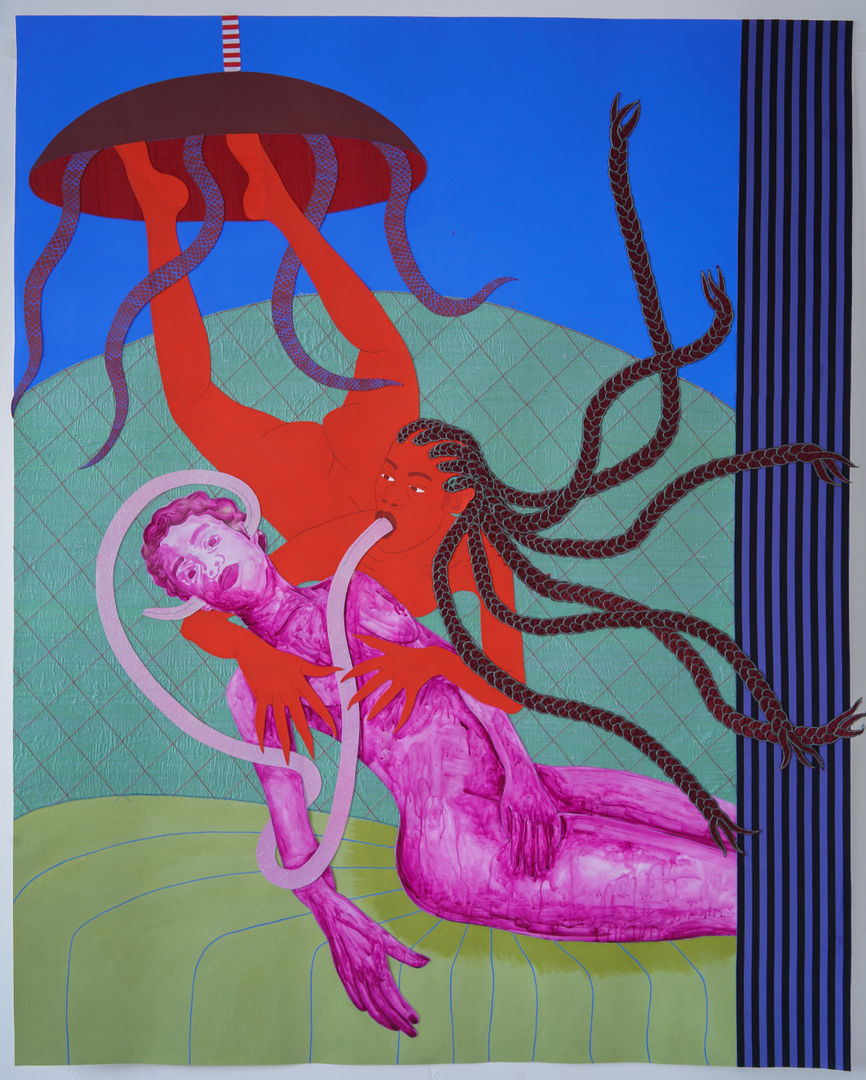Galerie Cécile Fakhoury is pleased to present Na Chainkua Reindorf ’s solo exhibition Strange Flesh in Dakar, Senegal, from May 16th to October 12, 2024.
For several years now, Na Chainkua Reindorf has been exploring the construction of imaginary worlds and myths through the art of masquerade. Inspired by the predominantly masculine traditions of masquerade in West Africa, Na Chainkua Reindorf offers a feminist reinterpretation through her long-running series Mawu Nyonu (2020- today), named after an imaginary secret society invented by the artist that means «God is a woman» in the Ewe language of Ghana. This secret society partly inspired by Voodoo cosmology is made up of seven female characters, the Glanu - or «skins». Each is endowed with its own powers, capable of transforming the individual who wears it as a costume.
After having introduced all 7 Glanu that make up Mawu Nyonu during her exhibition Up To No Good at the Nubuke Foundation in Accra, Ghana in 2022, Na Chainkua Reindorf chooses here to focus on one of the seven characters; that of Peli, who embodies the ideal of Seduction; an act that the artist represents as being entangled or trapped unsuspectingly by someone’s wiles. Continuing the metaphor, Na Chainkua Reindorf associates the figure of Peli with the thread that sutures, binds and imprisons; and makes this material the visual and conceptual starting point for the series presented here.
From one work to the next, we follow the silhouette of a woman, the main character in the story being written before our eyes. She struggles in a choreography as delightful as it is disquieting with Peli’s red, tentacled figure. In a ritual act, the woman wraps yarn around her hair, fingers or tongue. She invokes Peli, thus becomes Peli. She is then transformed into a hybrid figure, both human and grotesque, who overwhelms, dominates and controls. She becomes Strange Flesh.
For Na Chainkua Reindorf, the masquerade, approached as a performative ritual, opens up a new social space in which original, non-conformist identities can exist and develop. By transforming herself into Peli, this woman becomes as charming and attractive as she is egotistical and dangerous; a double and ambiguous dimension; the cohabitation of beauty and the grotesque at the origin of the feeling of disquieting strangeness that emanates from the works and the exhibition’s scenography. But by making the women she portrays take on the features of Peli and the other Glanu, Na Chainkua Reindorf gives life for the duration of a masquerade to powerful figures of women who regain control of their bodies and their narratives in an unrestrained celebration of self-expression.
Conceived as a visual narrative unfolding in space, Strange Flesh is an unabashed exploration of identity through the performance of masquerade. The exhibition is an opportunity for Na Chainkua Reindorf to pursue her reflections on current social issues, such as identity and gender, and how they are defined in their close relationship with traditional cultural practices.
